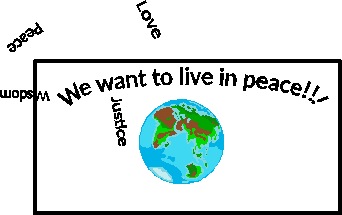Aims: 1) to learn and use N.L.U. during the lesson. To inform the students with the main events of the Great Patriotic War, to speak about some hero of the Great Patriotic War. To learn to use Grammar: Present Simple, Present Perfect, Past Simple, Past Perfect.
2) to form conversational skills, to develop reading, writing, speaking, using special N.L.U.. To use dialogues, monologues. Practice using grammar constructions.
3) to learn the students to love our Motherland, remember the heroes of the Great Patriotic War, be proud of their heroism.
To learn the students to be the patriots of our country, be brave, honest and kind, be ready to defend our country.
Visual aids: photos, pictures, stands, geographic map, slogans, lexical cards, songs, short compositions.
Type: combined lesson.
The lesson is connected with History, Literature, Geography, Russian and Kazakh History.
Plan
- Org. moment. Greeting. There are photos, pictures, some slogans and the geographic map on the blackboard.
- The teacher’s word:
On June 22,1941, fascist Germany attacked the Soviet Union. On the same On the same day the Government called on all people to rise up for a patriotic war against the fascist aggressors. All people took an active part in the war because they did not want to live under the yoke of any foreign invader. They fought for their Motherland, for a happy present and a still brighter future. By fighting against fascism, our people at the same time demonstrated their international solidarity and internationalism. They saved the people of many countries from fascism.
- Sounds the phonogram of the song: «Вставай, страна огромная!»
- Sounds the historical message:
Student 1
During the Great Patriotic war all people, not only adults, but even children too, fought heroically at the fronts and in the rear. They helped grown-ups everywhere. They worked in the fields, at the plants and factories; they helped the families of soldiers who were at the front.
Student 2
Many young people and even children became the members of partisan detachments. They carried messages and obtained information about the enemy plans and strength which the partisans needed. They showed great courage when they found themselves in a dangerous situation.
Student 3
World War II claimed more than 55 million lives. The war involved 72 countries. Hundreds of battles were fought during the war on land and sea. They were terrible. Our people will never forget those years of war, which began with the devastation of Russian cities and villages in June 1941, when the armies of Hitler and his supporters launched their attack on the East. Our people from Kazakhstan took an active part in the World War II.
Student 4
Our people will always remember the troubled autumn of the battle for Moscow; the Volga burning near Stalingrad, and the hungry eyes of children in Leningrad, begging their mothers for a piece of bread.
- the Teacher: “Now, students, let’s learn some N.L.U.”
Presentation N.L.U. (the words are written on the blackboard)
Germany – Германия
yoke - ярмо
to torture – пытать
unclad – раздетый
scafford – виселица
death – смерть
fear – страх
private – рядовой
liberation – освобождение
joy – радость
victory – победа
sign – знак, признак
star – звезда
machine-gun – пулемет
on behalf of – от имени
partisan – партизан
to nurse – ухаживать
scout – разведчик
soldier – солдат
officer – офицер
Reading the words after the teacher, with the teacher, by one self.
- Presentation the text: “Inna Konstantinova, a partisan” (the text is on a paper for every student).
The students read the text by a chain with the translation of part I. Part II without translation, but finding the sentences given by the teacher.
The teacher reads the sentences:
1.Однажды фашисты задержали Инну.
2.Офицер жег ее руки сигаретой.
3.Она вернулась к партизанам.
4.После этого она надолго заболела.
5.В ноябре Инна пересекла линию фронта с несколькими разведчиками.
6.Ей пришлось нести раненого товарища, и она могла делать это лишь ночью.
7.Она вернулась в партизанский отряд и работала там следующие 14 месяцев.
8.Они были в 8 км от линии фронта, когда натолкнулись на фашистов.
9.Фашисты ранили ее в руку и в ногу.
10.Инна упала, и фашисты убили ее.
- Conversation Practice:
The teacher divides the class into four groups and every student receives 5 questions over the text. The students prepare the answers:
- What girl was Inna Konstantinova?
- What diary did she leave?
- When did she begin to write her diary?
- To what form did Inna pass at that time?
- What did she write on her sixteenth birthday?
- What did she tell about her first love?
- Did Inna read much?
- How did she want to live?
- When did she join a nursing squad?
- To what column did she go in 1942?
- What did she learn there?
- Where was she sent?
- What did she report when she came back?
- Where was Inna arrested?
- Did she escape?
- When did she cross the front line?
- Why did Inna stay behind the front line?
- What mission was Inna given in 1944?
- Why did she decide to cover the retreat of her friends?
- What happened to Inna?
- Oral Practice.
The Teacher: “Put some questions to sentences”.
- The first part begins on the 18th of June, 1940.
- Inna got a present, it was a watch.
- Inna dressed as a schoolgirl and did not look like a partisan.
- In November Inna crossed the front line with some scouts.
- The enemies wounded her in the leg and then in arm.
The students prepare the questions for the sentences.
- Writing Practice:
The students work with lexical cards. Task: Match the translation with the words:
- victory
- sign
- liberation
- star
- private
- death
- scout
- machine-gun
a)освобождение
b)смерть
c)победа
d)рядовой
e)разведчик
f)знак, признак
g)пулемет


















